


Wilhelm Schubert has worked in the field of gardening and horticulture all his life. For the majority of his career he was the leader of the ecological testing lab for growing vegetables, a section of the Bavarian Institute for Viticulture and Horticulture. He lives and works in Bamberg, in southern Germany, in a pioneering architectural project: the "Ökosoziale Siedlung" (eco-social colony), built on ecological and social principles in the 1980s.
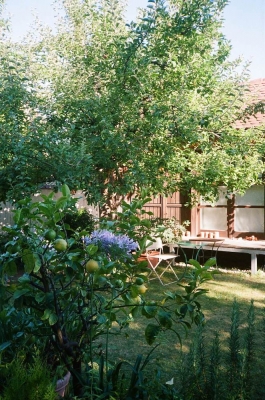


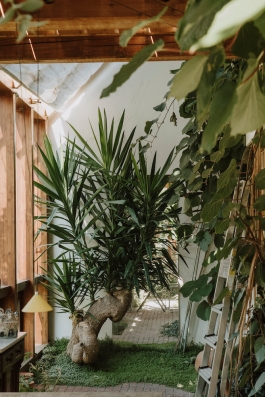
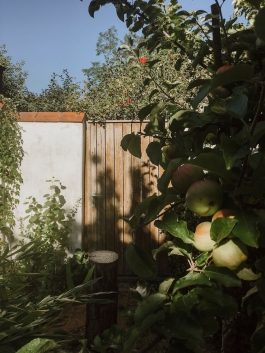
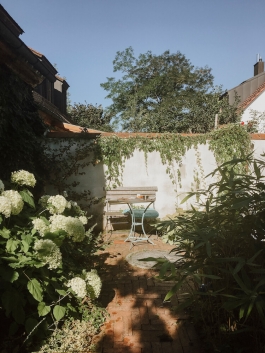
Bamberg is a city known for its heritage status as a "garden city", due to its long tradition of horticulture, within the city's old walls and in the close periphery. Wilhelm Schubert spoke to us not only about gardening opportunities nowadays, but also about the challenges horticulture faces on a larger scale now and in the near future. He leads by example, as he is a founder and active member of Transition Bamberg, organising self-led collective gardening programs in Bamberg.

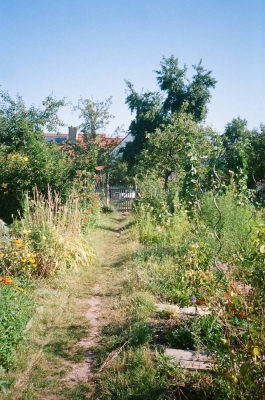


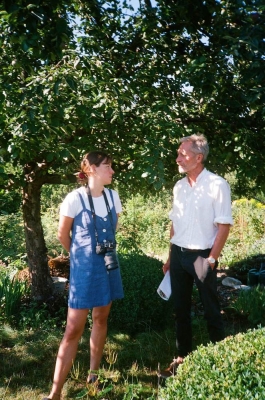
In addition to showing us all the garden premises he works for and with, Wilhelm showed us around his home, the "Ökosoziale Siedlung" Bamberg. He lives there together with his wife and formerly his children. Schuberts were part of the initial group of individuals, who joined together as an offspring of the federal nature conservation group, to build a new alternative colony for living together. Three main pillars of this colony are: "good neighbourhood, environmentally aware" and "adapted to the landscape". Despite being built in the 80s, the colony still has many valid points which are applicable today, as Wilhelm explained to us throughout our visit and talk.
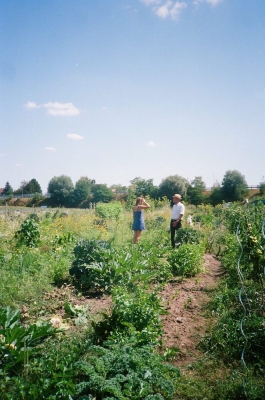
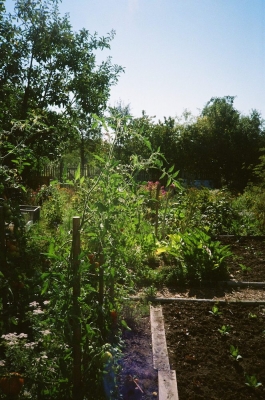

One of the main concepts of the colony is that it is free of cars – parking is located along the perimeter. Furthermore, the houses are aligned to share water tubes, heating and energy (they are assimilated in a row and not free standing). Each lot has a certain number of square meters for living and a large portion of land devoted to private garden space. The so called "Wohngarten" (garden for living) is adjacent to each house and can be privately used. The individual gardens are separated from the others by low, whitewashed brick walls with small doors that can be consecutively opened, allowing privacy but not isolation. The collective atmosphere can be felt but individualism is simultaneously lived and welcomed. A beautiful atmosphere is created with extensive shade from large trees, beautiful flowering plants and the mixture of solid walls and fluid space. The largely natural materials for the colony were chosen with respect to nature and the environment, as he explains in more detail in the video and podcast.
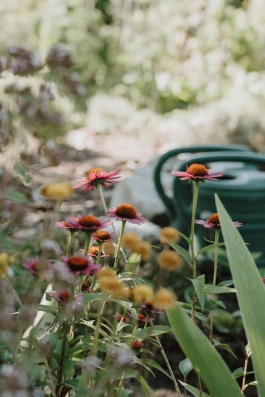
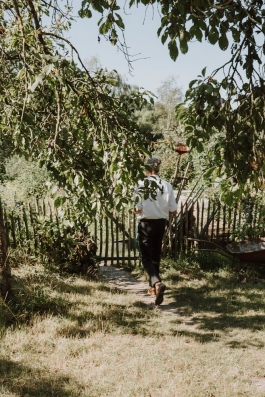
Next to the living area of the colony, the founding group decided to situate a “Nutzgarten”: a garden dedicated to fruits and vegetables, harvested for personal use. Wilhelm explained the underlying principles to us: the use gardens are free of fences, allowing communication and flexible use. When somebody travels, for example, the neighbours water and harvest their plants and this is reciprocated the next time around. When somebody wishes to annex a certain part of their garden, somebody else can easily and flexibly step in. This system allows for easy rotation and use, while the private gardens remain independent and intimate. This dichotomy of gardens surrounding the living spaces, creating a collective yet individual aura, fascinated us. The extensive knowledge on gardening that Wilhelm provided us with throughout our stay was overwhelming and we are excited to share some of these holistic ideas with you.
The colony raised many questions for us today, regarding the distribution of garden and built environment. To what extent can these two come together for a balanced relationship, also in urban contexts? How can greenery be successfully and sustainably integrated into daily lives, no matter where? We discussed similar issues with Rudolf Plochmann, on the scale of forests.
Name: Wilhelm Schubert
Location: Bamberg, Germany
Type: Video
Video music by Matteo Silvestri
Posted: 19. February 2021
Categories: germany, plants, regenerative agriculture, social
Wilhelm Schubert has worked in the field of gardening and horticulture all his life. For the majority of his career he was the leader of the ecological testing lab for growing vegetables, a section of the Bavarian Institute for Viticulture and Horticulture. He lives and works in Bamberg, in southern Germany, in a pioneering architectural project: the "Ökosoziale Siedlung" (eco-social colony), built on ecological and social principles in the 1980s.






Bamberg is a city known for its heritage status as a "garden city", due to its long tradition of horticulture, within the city's old walls and in the close periphery. Wilhelm Schubert spoke to us not only about gardening opportunities nowadays, but also about the challenges horticulture faces on a larger scale now and in the near future. He leads by example, as he is a founder and active member of Transition Bamberg, organising self-led collective gardening programs in Bamberg.





In addition to showing us all the garden premises he works for and with, Wilhelm showed us around his home, the "Ökosoziale Siedlung" Bamberg. He lives there together with his wife and formerly his children. Schuberts were part of the initial group of individuals, who joined together as an offspring of the federal nature conservation group, to build a new alternative colony for living together. Three main pillars of this colony are: "good neighbourhood, environmentally aware" and "adapted to the landscape". Despite being built in the 80s, the colony still has many valid points which are applicable today, as Wilhelm explained to us throughout our visit and talk.



One of the main concepts of the colony is that it is free of cars – parking is located along the perimeter. Furthermore, the houses are aligned to share water tubes, heating and energy (they are assimilated in a row and not free standing). Each lot has a certain number of square meters for living and a large portion of land devoted to private garden space. The so called "Wohngarten" (garden for living) is adjacent to each house and can be privately used. The individual gardens are separated from the others by low, whitewashed brick walls with small doors that can be consecutively opened, allowing privacy but not isolation. The collective atmosphere can be felt but individualism is simultaneously lived and welcomed. A beautiful atmosphere is created with extensive shade from large trees, beautiful flowering plants and the mixture of solid walls and fluid space. The largely natural materials for the colony were chosen with respect to nature and the environment, as he explains in more detail in the video and podcast.


Next to the living area of the colony, the founding group decided to situate a “Nutzgarten”: a garden dedicated to fruits and vegetables, harvested for personal use. Wilhelm explained the underlying principles to us: the use gardens are free of fences, allowing communication and flexible use. When somebody travels, for example, the neighbours water and harvest their plants and this is reciprocated the next time around. When somebody wishes to annex a certain part of their garden, somebody else can easily and flexibly step in. This system allows for easy rotation and use, while the private gardens remain independent and intimate. This dichotomy of gardens surrounding the living spaces, creating a collective yet individual aura, fascinated us. The extensive knowledge on gardening that Wilhelm provided us with throughout our stay was overwhelming and we are excited to share some of these holistic ideas with you.
The colony raised many questions for us today, regarding the distribution of garden and built environment. To what extent can these two come together for a balanced relationship, also in urban contexts? How can greenery be successfully and sustainably integrated into daily lives, no matter where? We discussed similar issues with Rudolf Plochmann, on the scale of forests.
Name: Wilhelm Schubert
Location: Bamberg, Germany
Type: Video
Video music by Matteo Silvestri
Posted: 19. February 2021
Categories: germany, plants, regenerative agriculture, social
CONTACT
We're based in Berlin for most of the year. Our mobile office likes to follow our European vision, traveling around to where PIONIRA takes us.
CONTACT
Instagram →
Facebook →
Spotify →
More →
© 2021 PIONIRA
Imprint. All rights reserved.
Privacy Policy